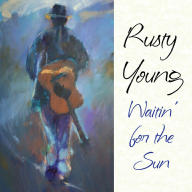Young was born in California in the mid-'40s and moved to Colorado soon after. He started playing guitar when he was six years old, and has recalled that guitar students in the area all started out on the lap steel guitar, advancing to the regular six-string after six months. This was probably due to the lingering popularity of Hawaiian music after the second World War, but as far as Young's parents were concerned, playing country music was the goal for their son. He started gigging in bars in Colorado when he was only 12, sticking to Sunday afternoon gigs, still playing steel. By 16 or 17, he was keeping a schedule that would have left adult professionals panting. He taught lessons in a guitar studio in the afternoons and then played country music in bars until the wee hours of the morning. Then he would pack up and head to jam sessions, catching a few hours of sleep before it was time to go to high school. In 1966, he was surprised to get a call from a local rock band, the Boenzee Cryque. "Are you sure you want him?" Young's mother apparently asked, "He's in a country band you know." Boenzee Cryque was about the most popular Denver rock band at the time and had done fairly well with several locally produced singles that were picked up by the psychedelic-obsessed Uni label. He worked with this band for two years, incorporating the pedal steel and utilizing some of his strange effects for the first time. In the meantime, a former student who had become road manager for Buffalo Springfield brought Young in contact with the hit group when the members were looking for a pedal steel player for their song "Kind Woman," and didn't want to hire any of the Los Angeles sessionmen. Young was flown out to L.A. to do the session. After he hit it off particularly well with Messina and Furay, it was only natural that Young would become part of a new band that formed in the aftermath of the Springfield collapse.
Originally, the band was to be called Pogo and even used pictures of a similarly named cartoon character in early promotion. The author of the Pogo strip, Walt Kelly, promptly sued. One letter was changed and Poco was born. Young wrote more than a dozen of the group's most well-known songs. The band was active until the end of the '80s, but seemed to make less and less use of Young's instrumental talents as the years went on.
Although based out of Nashville, Young avoided the recording session work that is the bread and butter of most pedal steel players in that area, due to the lack of space for experimentation. He could sometimes be heard playing solo at that city's Bluebird Cafe in the '90s and 2000s, but his main venture in the late '90s was a trio with John Cowan and Bill Lloyd called Sky Kings. The group recorded an album for RCA Nashville in 1992 but the label shelved the record. Sky Kings then moved to Warner, releasing three singles in 1996, but their completed From Out of the Blue never saw release. Rhino Handmade would release the unheard Warner album in 2000, while Sony put out the RCA Nashville album as 1992 in 2014.
Starting in the year 2000, a reunited Poco was Young's main concern. The group released Running Horse in 2002 and toured steadily over the next decade -- several live albums were released during this period -- before calling it a day after 2013's All Fired Up. Young intended to retire, but Poco played the occasional concert in the mid-2010s, leading up to the singer releasing his first-ever solo album, Waitin' for the Sun, in July 2017. The album was produced by Young's Poco bandmate Jack Sundrud. Rusty Young died at his home in Davisville, Missouri on April 14, 2021 at the age of 75. ~ Eugene Chadbourne, Rovi












